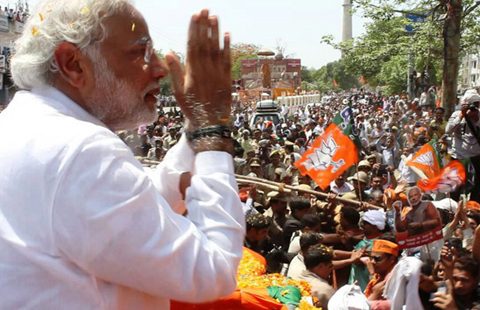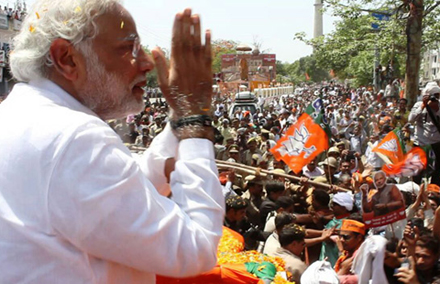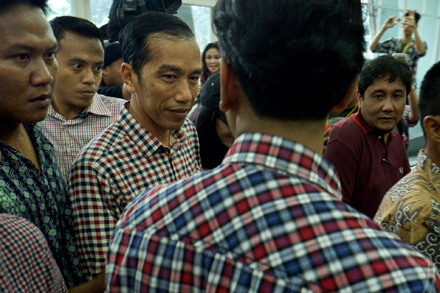Sandeep Ray contrasts the very different outcomes from elections in two of the world’s largest democracies.
This year, two of the world’s largest democracies, India and Indonesia went to the polls within two months of each other.
The winning candidates could not have been more different.
Indonesia’s president-elect is a young, modest, approachable former mayor, who won a hard-fought contest by promising transparency and civic participation in his government. India voted in 63 year-old veteran politician Narendra Modi – reputed to be a Hindu-nationalist hardliner with a penchant for big business. His perceived handicap, strong allegations of complicity in the mass-murder of Muslims in Gujarat in 2002, surprisingly did not prevent his meteoric rise in popularity.
While many are bitterly disappointed at Prime Minister Modi’s triumph, he won a free and fair election. Perhaps even more perturbing than Modi’s victory, was the inevitability that he would win – every poll before the elections had predicted it. How is it that Indonesia, only 16 years after the fall of the New Order, was ready to usher in a model democratic leader, while India, in its 16th general election since 1951, chose Modi – a man who leaves a lot to be desired in the realm of secular trust in a country historically polarised by religion?
Indonesia and India had both pushed to create democratic republics in the aftermath of independence. But while Nehru’s Five Year Plans sputtered along slowly, by the late 1950s Sukarno was see-sawing precariously between democracy and autarchy. The mid-1960s saw the nation veering sharply away from a democratic destination as the New Order ascended to power.
India did have its share of anti-democratic spells, most notably Indira Gandhi’s declaration in 1975 of a national emergency suspending many basic civic rights. But otherwise the free and secular model had been generally upheld. And yet in 2014 Indonesia seems to have made a swift and remarkable comeback from the long Suharto years, while India has regressed. One might consider a few broad factors to shed light on this puzzle.
First, for a nation that is frequently and correctly identified as having the largest Muslim population in the world, religion did not factor significantly in the Indonesian elections this year. Cornell University political scientist Tom Pepinsky has conducted longitudinal studies indicating that all other factors remaining the same, religion generally does matter in Indonesian politics – but significantly less so than other considerations such as economy, welfare and corruption.
This changed somewhat in the last years of President Susilo Bambang Yudhoyono’s government when extremist Islamist groups were emboldened in their crusades against Christians, liberal Muslims, Shias and the Ahmadiyyas.
And collectively, the four big Islamic parties PPP, PKB, PKS and PAN did make a six per cent gain in the legislative elections in 2014.
Electorally, this however, was not a game changer. In fact, when Prabowo chose to make an issue of religion by guaranteeing ‘the purity of religious teachings’ under his rule, it backfired on him and he hurriedly deleted it from his manifesto. Jokowi sensibly and successfully steered away from the issue of religion.
In contrast, religion has been the over-bearing tone in Indian politics this year. With Modi’s recent promises to rid India of ‘its slave mentality of the last 1000-1200 years’ (he interprets the transition to Islamic rulers in the second millennia as un-Indian), his exhortations to ‘send packing’ illegal Bangladeshi Muslims, and revisionist histories in textbooks being supported by the new ministry, the BJP (Bharatiya Janta Party) has made it clear that it operates within an essentialist Hindu scope.
Skeptics have even viewed Modi’s reputation of being anti-Muslim as having been an electoral advantage. Indeed, a ‘Modi wave’ swept across central and western India. It is however, important to point out that 69 per cent of Indian voters did not vote for Modi. As startling as that sounds, it was often the arithmetic of the first-past-the-post system and not an actual majority vote that led the BJP to their landslide victory of 282 out of 545 seats. An instrumental combination of religious fervor taking hold in electorally strategic states (which had a higher number of seats) was key to a BJP win.
Second, while India certainly has no dearth of renowned scientists, artists, and academics, and has made remarkable leaps in technology, it may surprise many that Indonesia is significantly ahead of India in basic adult literacy.
It is estimated to be 93 per cent for Indonesia and still only about 74 per cent for India.
This achievement is actually in large part due to education policies implemented during the long Suharto years. Some benefits of that incremental advancement were reaped only recently as Indonesia went from autocratic to democratic rule. In functional democracies with a robust literate population, candidates have a better shot at convincing voters of the merits of a self-determined future.
Jokowi reached out to his followers by persuading them that he was creating a political movement where their participation would matter. It worked. A significant number of Indonesians with basic literacy, the group that probably had the most to gain from a new awakening in the government, voted for him. In India, after a decade of weak leadership by the Congress Party, many of Modi’s supporters were persuaded not by the lure of democracy and civic participation but by entrusting their future in what was billed as a heavy-handed ‘big brother’ type leadership.
Unsurprisingly, despite its rising popularity elsewhere in the country in 2014, the BJP was unable to make dents in three large southern states with high literacy rates – Andhra Pradesh, Kerela and Tamil Nadu (average literacy 90 per cent) – while it swept Rajasthan, Madhya Pradesh, Uttar Pradesh and Bihar in the ‘Hindi heartland’ (average literacy 69 per cent).
Finally, the persistence of arcane dynastic rule was a deal-breaker for India’s democratic aspirations. In the aftermath of the Congress Party’s walloping at the voting booths (securing only 42 seats or barely eight per cent of the total), Shashi Tharoor, possibly one of the most educated, self-achieving politicians ‘modern’ India has produced – a former UN Secretary-General contender no less– vehemently insisted in an interview that nominating Nehru progeny was ‘not in contradiction’ with the ideals of a modern political party.
‘But this is modern India! What about meritocracy?’ high-decibel television host Rajdeep Sardesai had yelled in exasperation. Indeed, it has taken an absurd degree of insularity and arrogance, ills common to long-running, quasi-feudalistic styled governance, for the Congress Party (and by extension the coalition UPA) not to admit that Nehru scion Rahul Gandhi was hardly a challenge to Narendra Modi. Yet, an alternate candidate in a populous nation with many capable politicians was never seriously considered.
While Indonesia does have its share of family backed politics, it is somewhat in check. Megawati didn’t ride for free on her father’s legacy and Titiek is Suharto’s only offspring who successfully ran for Legislative Council, winning her seat this year. This defeat of New Order hardliner Prabowo, a man with deep pockets, a billionaire brother, and decades-old family connections (he was a Suharto son-in-law) is case in point.
When a secular, former furniture salesman of modest means wins the popular vote over a wealthy ex-army general, especially in Southeast Asia, it is a watershed moment in that nation’s democratic journey. In India, the persistence of non-meritocratic dynastic ambitions, a faltering economy, resurgence of religious sectarianism, a weakened minority, an under-educated populous, and conducive electoral arithmetic – all of these created conditions favorable for a takeover by someone with Modi’s far right-wing credentials.
Is India in peril with Modi in office?
University of Chicago political scientists Lloyd and Susanne Rudolph have long argued that right-wing forces like the BJP tend to become more centrist when in power. Modi certainly realises that to ensure a second term victory he will need to improve on his rather low 31 per cent voter success and that that support will have to come from outside his current base.
Many are hoping that Modi’s incendiary positions were merely election time chest-thumping and that he will veer towards sensible rule. The stock market is up five per cent since he took office in May, and the US and the UK have lifted their visa bans on him.
Outspoken anti-Modi intellectuals like filmmaker Anand Patwardan, economist Amartya Sen and author Arundhati Roy however, continue to express their grave concern that insidious change will gradually envelop the country. They contend that India will increasingly position itself as a nation eager to give industrialists and big-capital a leg-up in a manner that will keep widening the already harrowing gap between the haves and have-nots, while infiltrating the nation-wide judiciary with a pro-Hindutva bias that puts minorities in peril.
Indonesia will need a lot more than an affable, ‘people’s man’ to steer it to a robust democracy. Despite Jokowi’s strong track record as Governor of Jakarta, and his perhaps idealistic intentions, the calculus of coalitions dictate that the power-sharing terrain will remain rife with concessions. His recent plan of outsourcing his cabinet nominations to public opinion polls was more stunt than practicality and has drawn heavy criticism.
Indonesia is currently besieged with financial problems – elevated fuel subsidies and a steep drop in price for many of its basic exports. Unlike Modi who faces limited opposition, Jowkowi has opponents with strong financial influence and ties to old military-styled cronyism waiting to call out on incompetence.
Jokowi has one key asset at the moment however – tremendous adulation from his supporters, reminiscent of independence-era Sukarno. But unlike the charismatic first President of Indonesia, who steered the country with a wayward personal style of governance he labeled ‘guided democracy’, Jokowi seems to be determined to let democracy guide him.
Sandeep Ray is a filmmaker and a doctoral candidate in history at the National University of Singapore.
 Facebook
Facebook  Twitter
Twitter  Soundcloud
Soundcloud  Youtube
Youtube  Rss
Rss 

